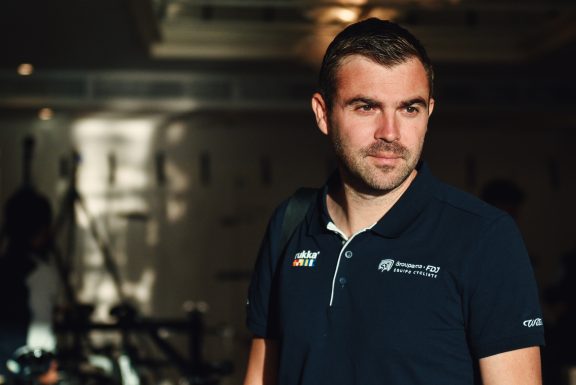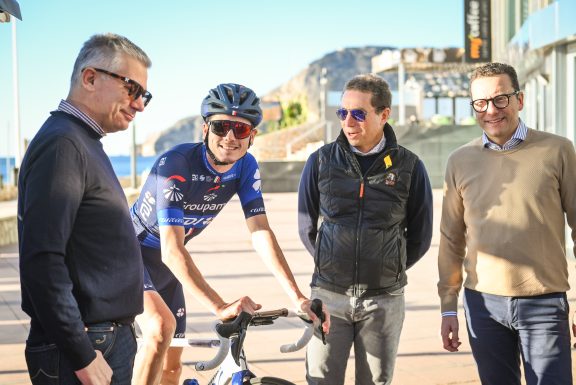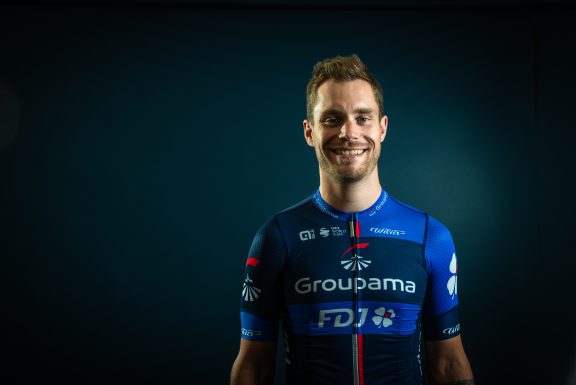After his eighth season within the pro ranks was not as successful as he hoped for, Arnaud Démare took the time to review his situation during the offseason. The reflection he shared with the team, after having thought about it for several months eventually led him to take on the new season with a fresh new philosophy and a revitalised motivation. At 28 years of age, the sprinter from Picardie wants first and foremost to get back to winning regularly, even though it would mean giving up some of his favourite races. He tells more about it in this in-depth interview.
Arnaud, the first new venture of your season was the Sierra Nevada training camp that ended last week. Why did you want to experience it?
Nowadays, you need constant evolvement and you need to grab few performance percentages where you can. You notice that many guys go to altitude to get fully ready. So when you don’t do it, you feel like you’re at a disadvantage. This winter, the team presented us with the opportunity to do it and I was definitely ready for it. Above all, it was an experience, a discovery, but it must also be said that cases where the riders do not benefit from it are quite rare. As far as I am concerned, I think that I will have a good response to it and that it will pull me up. And if I don’t get any particular benefit from the altitude, the training camp itself was very good anyway.
“I didn’t expect such a sudden feeling of exhaustion”
What was so different from a “traditional” training camp?
Actually, the training was very similar to what it would have been in Calpe, for example. We only needed 2-3 days of adjustment when we got there. We had lighter loads and we were at lower intensities during that period, but once the adaptation period had passed, we did some good rides, like in any other camp, with similar intensities. The work itself was the same. The slight difference is that recovering was more difficult because we had less oxygen up there. The difference was made during these 17-18 hours a day we were spending 2000 meters above sea level.
Have you coped well with the training camp’s workload?
It is too early to say it has done me any good. I had a big decompression right after the camp. In the last rides and last sessions, we make sure to hang on even if we start to feel really tired. However, as soon as I got home I immediately felt a sudden tiredness. Since Tuesday evening, things have been better. I feel that mu body is starting to take over and that overcompensation is happening. That being said, I didn’t expect such a sudden feeling of exhaustion. Now, I’m being patient, and when the process is over, I’ll be in much better shape than I was beforehand. Anyway, my shape is improving and I’m sure I’ll feel better and better by the start of the UAE Tour. Then, we will see how it goes during the race, with high intensity.
Since your return will be at the UAE Tour, you won’t be in the Belgian opening weekend, which is a rare thing. Why have you made that choice?
This season’s objective is to re-target my goals, to increase my chances of winning. On the UAE Tour, there is certainly a lot of competition, but also some nice sprints to go for. There are four stages for sprinters and another one for punchers, so that means great opportunities to chase wins. I wanted to set myself up for more potential victories and therefore I am skipping the opening weekend in Belgium with the Nieuwsblad and Kuurne. These are races that I really like but that don’t give me, these days, the chances of success that I would hope for.
“My main priority is to win”
Will you still have a little heartache while watching the results of these races, or is it a decision you’re completely comfortable with?
I think I made the best choice for me, in this case, but also for the whole race schedule that we have built for this season with the team. I have absolutely no bitterness about races that are not on my calendar. I’m all right with this. In the United Arab Emirates for example, I know I will have at least four opportunities, and I am completely satisfied that I made this decision.
Was the making of your 2020 schedule done after analysing your previous seasons and your potential disappointments?
It’s actually very simple: when I win, I do it in the sprint. So we just need to favorize this area. I have to compete in more sprints. For example, when we got to the Giro last year, I had only competed in five or six sprints, which is really not much. Now, I will be able to refocus on this and properly chase the victories. Our idea is that I could be a potential winner in all the races I’m going to start, which will be different from the previous years. It is true that the Tour of Flanders is a beautiful, fantastic race, but on paper, I am not among the potential winners.
Do you think you weren’t competing in enough races where you had a real chance of winning?
Over the course of your career, and with age, you gain experience … The past season may have been the one where I learned the most, paradoxically by winning less. I realized that instead of going for all the races that I love, I would be better off targeting sprints. For instance, I really like the E3, the Tour of Flanders, the Omloop Het Nieuwsblad or Kuurne-Brussels-Kuurne, but it is time to refocus my priorities. And my main priority is to win. Being fourth or sixth in Kuurne, who cares (sic).
“In 2019, my confidence fluctuated big time”
Does that mean that you’ll be refocusing on the sprint in training as well?
I kept doing the specific training for the sprint I was doing before. I feel that I have made further progress this winter and mostly, I regained explosiveness. I might have pushed this area aside a little bit in the last few years by doing aerobic work at the same time. I wanted to refocus on sprinting during training, and by extension, I’m mentally more focused as well. There is a real psychological work that comes into play. Now that I’m going mainly for the sprints, I know that when the final will get closer, I’ll have to go for it without questioning myself.
Is it too difficult nowadays to aim for being part of the top 3 both in the sprint and Classics areas?
I’m certainly good at sprinting, but I’m also not the best, I don’t win as much as others. I’m also doing well in the Classics, but it’s even more random and it’s not in my hands alone. If my opponents escape, my chances slip away. We also see that a rider like Peter Sagan, even if he is Sagan, he also fades a little in the sprints. Actually, only Tom Boonen in his best years managed to be very strong in both areas. If I take last year’s Paris-Tours as an example, I was there with this sprinter label, so obviously the others did not want to take me to the finish. If I find myself in the final of the Tour of Flanders with 10-15 guys, even if I am very strong, they will do everything they can to avoid finishing with me. Nowadays, it would be difficult for me to do well in these scenarios. I must therefore target the Classics that are likely to finish in a sprint, namely Gand-Wevelgem, Milano-Sanremo or even Paris-Roubaix, where there is always a possibility to get to the velodrome in a small group.
What was the turning point, what made you change your strategy?
If I had won more Classics, I would have headed in that direction, but since my victories were all collected in a sprint, I am moving towards that. And no matter the “quality” of the victories, once you have 10-15 of them, you have them, period. However, to get there, you have to have full confidence from the start, something I missed last season. The breaking point was gradual. This lack of victories that I felt also played in the new approach. Then the Classics were disappointing. I might have done a great campaign if I hadn’t had the flu, but I was pretty disappointed nonetheless. On the Giro, I was physically ready, but I think I wasn’t mentally prepared to win. I was consistent but hadn’t been a winner for a while. I was missing something. I then won one stage and it felt good, but after that I lost the cyclamen jersey. Psychologically, it was a year during which my confidence fluctuated big time. In high-level sport, it is something very important. You really need to be well surrounded to maintain full confidence even when things don’t go your way. Now, I want to go for a victory as quickly as possible to gain this confidence and then be relieved mentally.
“I want to win against Viviani, Ewan Ackermann, that’s what’s thrilling to me”
Going where you have the best chance of winning, it doesn’t mean going to less prominent races?
Despite my status, I am sure I would be very glad to win a race even if it is lower rated. But it is true that I want to win against Viviani, Ewan, and Ackermann. That’s what’s thrilling to me. I like the challenge, so obviously the more competitive it gets, the better the victory. Anyway, when you have a look at my schedule, you’ll notice that there will be a high level of competition at the start of every race. The Circuit de la Sarthe will certainly be a little less prestigious, but it’s still a difficult race. Other than that, until Paris-Roubaix, 80% of the races I will take part in will be WorldTour races. It’s like that every year. So inevitably the level is high there and that is perhaps what caused me harm, last year in particular. There’s a high level everywhere I go, so getting a confidence boost is not easy. When I was returning to competition at Bessèges and netting two victories, it was perhaps “only” Bessèges, but psychologically, the click was done. At least I felt relieved, and the team did as well.
Are Paris-Roubaix and Milan-Sanremo still the most important appointments in the start of your season?
No, I don’t give extra importance to some races over others. My goal is to take the races one after the other and to get as many victories as possible. I’m not in that state of mind that may have been mine before, and that may have done me harm. By being focused on a specific goal, you almost forget to be psychologically ready for the day’s race.
We do know, however, that the challenge of entering the club of the winners in all 3 Grand Tours will be a big goal of yours.
I had already asked to do the Vuelta last year but it was not to be. Then, in October, when I discovered the route of the Tour, I was doubtful about participating. I then decided that I was going to go back to the Giro, with many sprints, and when the Vuelta course came out, given the number of sprints compared to other years, it was immediately clear that I wanted to be part of it. Even if today I’m taking gradual steps, when the time comes as I prepare for the Vuelta, I will certainly have this goal and this achievement in mind. It will really be something that I will hang on to in order to be extra motivated during training.



No comment